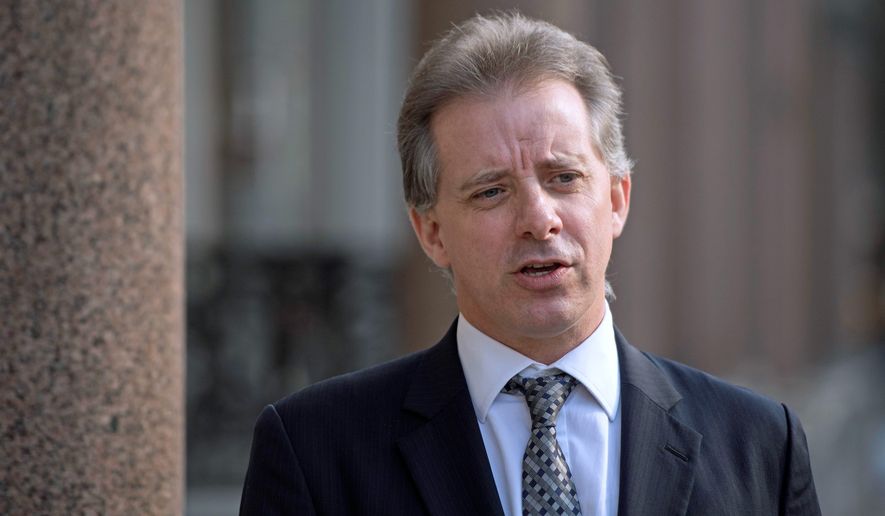The Steele Dossier — key evidence the FBI used to justify spying on a Trump campaign figure in 2016 — was based in part on Russian disinformation, two top senators revealed, citing newly declassified footnotes from an inspector general’s report.
Republican Sens. Charles E. Grassley of Iowa and Ron Johnson of Wisconsin, both committee chairmen and top investigators, said that given the Steele Dossier was funded by the Democratic Party and the Clinton campaign, that means they were actively responsible for spreading Russian disinformation that has plunged the country into political turmoil for much of the last three years.
While the work of British ex-spy Christopher Steele had long been suspected of being tainted by Russian disinformation, the new revelation is the first official confirmation, and it comes from the Justice Department Inspector General Michael E. Horowitz’s authoritative report on the FBI’s bunglings.
The information was contained in several footnotes in the report, which had been redacted from the public release, but which were made public Friday.
“These footnotes confirm that there was a direct Russian disinformation campaign in 2016, and there were ties between Russian intelligence and a presidential campaign — the Clinton campaign, not Trump’s,” Mr. Grassley and Mr. Johnson said.
Footnote 350 says Mr. Steele’s reporting about the activities of former Trump personal lawyer Michael Cohen were “part of a Russian disinformation campaign to denigrate U.S. foreign relations.”
The footnote also says information on Mr. Trump’s 2013 trip to Moscow was falsified by Russian intelligence, then injected into the American political conversation.
The Steele dossier explicitly cited Russian officials for some of its most salacious details, but the newly released footnotes officially label them to be disinformation and raises further questions about the dossier.
An FBI spokeswoman declined to comment.
The FBI relied on the Steele Dossier as key evidence in its application for a secret warrant under the Foreign Intelligence Surveillance Act to spy on Carter Page, a Trump campaign adviser.
Mr. Steele was working for Fusion GPS, which was being paid by the Clinton campaign and the Democratic National Committee to gather dirt on Mr. Trump.
The FBI learned that one of Mr. Steele’s sources for the dossier was linked with Russian intelligence, but the FBI failed to inform the secret court that oversees FISA when it asked permission to spy on Mr. Page.
Mr. Trump, enraged by the FBI investigation, would fire then-Director James Comey in spring 2017, spurring the Justice Department to name a special counsel to investigate. Robert Mueller’s team found no conspiracy between the Trump campaign and Russia, but did ding Mr. Trump for trying to interfere with the probe.
Mr. Johnson and Mr. Grassley said the FBI knew it had contradictory and exculpatory evidence, but engaged in “blind pursuit” of the president.
“Had FBI leadership heeded the numerous warnings of Russian disinformation, paid attention to the glaring contradictions in the pool of evidence and followed long-standing procedures to ensure accuracy, everyone would have been better off. Carter Page’s civil liberties wouldn’t have been shredded, taxpayer dollars wouldn’t have been wasted, the country wouldn’t be as divided and the FBI’s reputation wouldn’t be in shambles,” the senators said.
Attorney General William P. Barr last year tapped U.S. Attorney John Durham to review the origins of the Russia probe and whether any crimes were committed
Mr. Barr said last week that the investigation has uncovered “troubling” evidence of possible abuses, hinting that criminal prosecutions could be coming.
“My own view is that the evidence shows that we’re not dealing with just the mistakes or sloppiness,” he said in an interview with Fox News. “There was something far more troubling here. We’re going to get to the bottom of it. And if people broke the law and we can establish that with the evidence, they will be prosecuted.”
An FBI lawyer involved in the Page warrant applications is said to be under criminal investigation for altering an email related to the warrant renewal application.
Kevin Clinesmith had changed a document submitted to the FISA court to make it appear as if Mr. Page was not working with the CIA, when in fact he was.
Last month, Mr. Horowitz released a broader review of the FBI’s FISA applications, uncovering even more flaws. Mr. Horowitz discovered an average of 20 errors in the 29 applications he scrutinized.
Missteps included the lack of documentation for accusations lodged in the warrant request, he said
The Justice Department also disclosed that an internal review turned up two FISA applications with “material errors or omissions,” according to court filing unsealed Friday.
However, the department maintains the errors did not change the probable cause needed to request a warrant.
The FBI’s missteps have drawn repeated rebukes from the Foreign Intelligence Surveillance Court. Typically tight-lipped, the court has ripped the FBI twice for failing to follow proper FISA procedures.
Judge James E. Boasberg said last week Mr. Horowitz’s two reports undermine their confidence in the FBI’s accuracy.
“The OIG Memorandum provides further reason for systemic concern,” Judge Boasberg wrote. “It thereby reinforces the need for the court to monitor the ongoing efforts of the FBI and DOJ to ensure that, going forward, FBI applications present accurate and complete facts.”
• Stephen Dinan can be reached at sdinan@washingtontimes.com.
• Jeff Mordock can be reached at jmordock@washingtontimes.com.




Please read our comment policy before commenting.